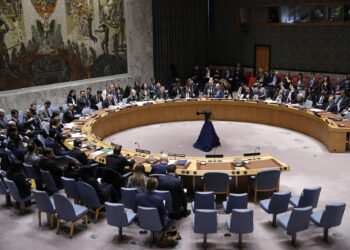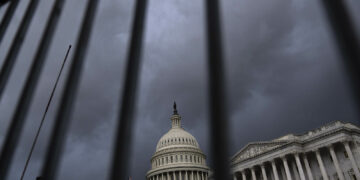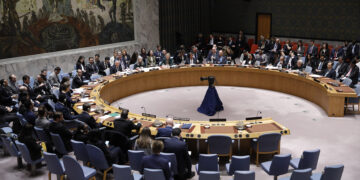Munir Nuseibah is a human rights lawyer and academic based in Al-Quds University in Jerusalem.
Adam Shapiro is the Director of Advocacy for Israel-Palestine at DAWN.
When members of Israel's settler community gathered in Jerusalem late last month for a conference calling for the resettlement of Gaza, it was not some fringe political event. Organized by Nahala, a radical pro-settler organization, and billed as the "Victory of Israel Conference: Settlement Brings Security," it included 12 Cabinet ministers and at least 15 Knesset members as speakers, who all announced their plans for Gaza to rapturous applause.
"We must encourage voluntary migration," National Security Minister Itamar Ben Gvir said of the more than 2 million Palestinians in Gaza. "Let them leave." He declared that the "only humane solution for Gaza is the mass deportation of its inhabitants." Among the other Israeli government officials who spoke was Communications Minister Shlomo Karhi, a member of Prime Minister Benjamin Netanyahu's Likud Party. "'Voluntary' is at times a state you impose [on someone] until they give their consent," he told the crowd.
The settlers were also celebrating the cutting of funding to UNRWA, the United Nations refugee agency that is a lifeline for Palestinians in Gaza and has provided essential services to Palestinian refugees since 1949. Led by the United States, several Western countries immediately suspended funding after Israel alleged that 12 UNRWA employees had been involved in Hamas's attack in southern Israel on Oct. 7. The agency employs about 13,000 people in Gaza, and about 30,000 across the Middle East. To the settlers gathered in Jerusalem, cutting off money to UNRWA was a political achievement. They see it as enabling them to take Gaza—by making the "voluntary" involuntary and forcibly displacing Palestinians left fully exposed to the risks of famine, disease and death while under Israeli bombardment.
The Israeli military's destruction of civilian infrastructure combined with the cutting off of water, fuel, food and electricity is an intentional policy to force Palestinians to leave their homes in Gaza.
- Munir Nuseibah and Adam Shapiro
The settlers' conference came just a week after Netanyahu reiterated his longstanding rejection of a Palestinian state. Netanyahu's statement—that "in the future, the state of Israel has to control the entire area from the river to the sea"—echoed his presentation at the United Nations General Assembly last September, when he presented his vision of a "new Middle East," with a map that showed Israel as the only country between Jordan and the Mediterranean Sea, effectively erasing Palestinians. Netanyahu's rhetoric is red meat to the settlers, who view their efforts to take Palestinian land as fulfilling not only messianic or nationalist fantasies, but also a fundamental component of Israel's security. The latter position gained traction among Israeli governments in the 1970s, as something of a self-fulfilling prophecy. As more settlers illegally and defiantly set up outposts in the West Bank and Gaza, successive Israeli governments backed down, effectively "legalizing" the settlements in Israeli law and then developing a national security doctrine in which settlements were key.
Former Prime Minister Yitzhak Rabin's political career demonstrates how much political power in Israel lies with the settler movement, regardless of who is prime minister. "We will not tolerate provocative and unauthorized initiatives in the occupied territories," Rabin stated in a 1976 speech in the Knesset, when he was serving in his first term as prime minister. "Settlement is not a demonstration, it is a violation of the law." Despite this seemingly unequivocal position, Rabin eventually succumbed to the political power of the settler movement. In his second stint as prime minister from 1992 until his assassination in 1995, his government invested billions of shekels in infrastructure and bypass roads in settlements across the West Bank, including around Ramallah, Bethlehem and Hebron. "These roads became the routes of development for the settlements and led to huge growth," according to Hagit Ofran, the director of Peace Now's Settlement Watch project. "No longer did one have to travel on dangerous, crowded roads between Palestinian towns; fast, convenient roads significantly reduced the commute time between Israel and the settlements and strengthened a sense of security."
The cut to UNRWA's funding also has a longer history in Israel, as Israeli governments for years have undertaken a sustained campaign against the U.N. agency because of its support to Palestinian refugees, which enables them to continue living in the occupied Palestinian territory. In 2018, President Donald Trump fulfilled a longstanding right-wing demand in Israel when he ordered a halt to U.S. contributions to UNRWA—a move that Netanyahu praised while also calling to "abolish the refugee institution."

UNRWA has been targeted for years by NGO Monitor, a Europe-based organization that "monitors" human rights and humanitarian organizations it determines to be insufficiently pro-Israeli. In early December, Knesset member Sharren Haskel, co-chair of its Christian Allies Caucus, presented baseless claims against UNRWA to European parliamentarians in Brussels, casting UNRWA as an "accomplice" in the Hamas attack on Oct. 7. Later in December, Israeli media reported that the Foreign Ministry had produced a classified report detailing a plan to dismantle UNRWA and completely end its operations in Gaza, based on "alleged UNRWA cooperation with Hamas." Then, in early January, Noga Arbell, a former Israeli Foreign Ministry official, told a Knesset committee, "It will be impossible to win the war if we do not destroy UNRWA, and this destruction must begin immediately."
UNRWA is the primary humanitarian agency in Gaza, with over 2 million people depending on it for their basic survival. Without this critical life-saving support, Palestinians face the most grim of options—stay and risk death, including by starvation, or be pushed across the border to the Sinai Peninsula in Egypt and become refugees outside of Palestine. Despite pronouncements by American and other Western officials, no Palestinian believes that if they leave Gaza they will be able to return, as evidenced by the millions of Palestinian refugees in Lebanon, Syria and Jordan, not to mention the West Bank and those who live in Gaza but who have been refugees since 1948.
The Israeli military's destruction of civilian infrastructure combined with the cutting off of water, fuel, food and electricity is an intentional policy to force Palestinians to leave their homes in Gaza. This includes decimating and virtually depopulating Gaza City, the largest Palestinian city in the world. Cumulatively, it amounts to forced displacement, and cannot be justified by Israeli leaflets instructing Palestinians to leave. The forced displacement of Palestinians in Gaza is a component of South Africa's charge of genocide at the International Court of Justice, which was found to be plausible enough for the court to issue binding provisional measures to Israel, including ceasing all actions that are in breach of the Genocide Convention. While Israel itself did not cut funds to UNRWA, and therefore technically is not disabling the agency, its campaign against it and its demands to its Western allies make the Israeli government complicit.
The $95 billion U.S. foreign aid bill passed by the Senate this week, which is awaiting a vote in the House of Representatives, not only includes $14 billion in additional military aid for Israel's war in Gaza, but also formally bars U.S. funding for UNRWA. "None of the funds appropriated or otherwise made available by this Act and prior Acts making appropriations for the Department of State, foreign operations, and related programs may be made available for a contribution, grant, or other payment to the United Nations Relief and Works Agency, notwithstanding any other provision of law," the bill reads.
By halting funding to UNRWA, Western governments are abetting Israel's political ambitions for Gaza, including those of the settler movement, even as a genocide is potentially being carried out by Israel—and all in plain sight.
- Munir Nuseibah and Adam Shapiro
Effectively shutting down UNRWA's funding could help ensure three political outcomes for Israel. First, Gaza could be depopulated of its Palestinian population, either because the number of dead will massively increase or Palestinians will flee across the Egyptian border to access humanitarian aid from agencies currently blocked from entering Gaza, or both. This is the settlers' vision of ethnic cleansing, with new Israeli settlements established on land emptied of Palestinians.
The second possible outcome, which has received far less attention given the focus on Gaza, would expand the genocidal effects of Israel's campaign beyond Gaza to Palestinian refugees across the region—in Jordan, Lebanon and Syria. UNRWA is a lifeline for the millions of Palestinians in those countries, without which their already tenuous existence could become untenable. Already in the aftermath of the Syrian civil war and the rounds of internal conflict in Lebanon, Palestinian refugees have sought safety and security as part of the waves of refugees arriving in Europe. Without UNRWA, further dislocations and instability in the region will be virtually inevitable.
Third, with the defunding of UNRWA, Israel could fulfill its long-sought objective of eliminating the issue of Palestinian refugees from any remnant of a "peace process." Since the state's establishment in 1948, Israel has prevented refugees who have been forcibly displaced from their homes from returning and denying that they even have a case. Already the international community is focused on tallying the cost of rebuilding Gaza and calling for the return of the displaced to (nonexistent) homes in Gaza, yet with more than 70 percent of Palestinians in Gaza already refugees from 1948, the real calculations that should be made are those that would result in Palestinians achieving their full rights. With their homes in Gaza City and Khan Younis and Rafah in rubble, why shouldn't these refugees be able to return to their homes in Bayt Daras, Iraq al-Manshiyya and Hamama, to name but a few of the hundreds of Palestinian villages previously erased by Israeli forces?
The allegations made against the 12 UNRWA employees in connection to Oct. 7 are serious and have been taken seriously by the agency and the U.N. more broadly. UNRWA promptly fired them and has said they will face criminal prosecution. Yet, there is a larger context—both in terms of the pressing humanitarian crisis in Gaza and the long-term effort of Israel to both dismantle the agency and displace Palestinians—that cannot be ignored. By halting funding to UNRWA, Western governments are abetting Israel's political ambitions for Gaza, including those of the settler movement, even as a genocide is potentially being carried out by Israel—and all in plain sight.






































